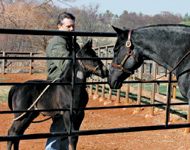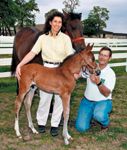Cloning results copied for commercial enterprise
Austin, Texas - A partnership between ViaGen Inc. and Encore Genetics produced the first commercially cloned mare in the United States. Royal Blue Boon Too is the genetic replica of a champion cutter owned by Elaine Hall.
AUSTIN, TEXAS — A partnership between ViaGen Inc. and Encore Genetics produced the first commercially cloned mare in the United States. Royal Blue Boon Too is the genetic replica of a champion cutter owned by Elaine Hall.

Champion cutter Royal Blue Boon (mare) shows interest in its genetic replica, Royal Blue Boon Too, born Feb. 19.
"The birth of Royal Blue Boon Too, our clone, represents a significant advance in reproductive technology for horse breeders, giving them the opportunity to consider gene banking and cloning for important genetic lines," says Dr. Brad Stroud of Encore Genetics.
The clone will be a breeding mare, a task so far left undone, as no cloned horses have reached maturity. The first equine clone was unveiled in Italy in 2003. Last spring, researchers at Texas A&M University College of Veterinary Medicine and Biomedical Sciences were the first in North America to clone a horse for a private owner; another followed. Dr. Katrin Hinrichs, veterinarian and professor, led the research team.
Hinrichs says thus far, both foals cloned at Texas A&M, as well as the other produced in Italy, have developed "completely normally."
Although equine copies haven't had the opportunity to verify breeding prowess, other species have shown normal behaviors.
"From a cattle standpoint, some of my clients have had numerous clones that have been perfectly normal breeders," Stroud says.
ViaGen expects to deliver six more cloned horses this spring. The company charges about $150,000 for the first copy of a genetic line.

Dr. Katrin Hinrichs, displays Paris Texas, the first cloned foal in North America, born March 19, 2005. The horses continue to develop normally.
Royal Blue Boon Too was born to a recipient mare on Royal Vista Southwest farms in Purcell, Okla., on Feb. 19.
"From the time I transferred the embryo into the recipient mare, the pregnancy was normal in every way and the birth followed suit," says Jim Bailey, DVM, manager of Royal Vista Southwest, a breeding technology center in Oklahoma. "The resulting foal was born normally and immediately stood to nurse. She bonded well with the recipient mare and continues to grow and play in the sun."
ViaGen used a skin biopsy that was cultured into connective tissue cells for the cloning process; Texas A&M used a very similar process, Hinrichs says.
But the research now underway at Texas A&M University revolves around efficiency and efficacy of the cloning procedure.
"We would all like to know what the egg is doing," she says. "The only reason this procedure works is because the egg can take the skin cell nucleus, change all of its on/off switches, and make it start producing the right protein for this egg to be an embryo. Right now, nobody knows what the egg is doing to achieve that. So, by trying to study what the egg is doing, we're also hoping to find ways to help the egg do it more effectively so we don't have pregnancy loss along the way so that we have a higher rate of the embryos becoming transferrable, even at seven days."
The Link Equine Reproductive Biology Program at Texas A&M does work on fertilized eggs as well as cloned embryos. Fertilized embryos have a 25-percent to 35-percent blastocyst development rate versus about 5 percent in cloned embryos, Hinrichs says. "So the question is how does a cloned embryo differ from a fertilized embryo, and how can we help the egg do its job more effectively to make these embryos more similar?"
Although much of the research work underway will yield little clinical relevance in the near future, reproduction veterinarians eagerly await insights that might be gleaned from exploring oocyte behavior so breeding processes might be more efficient and effective.
"I think that cloning is an interesting scientific development that will help untangle some of the mysteries of reproduction," says John V. Steiner DVM, Dipl. ACT, of Hagyard Equine Medical Institute. "I think there is tremendous potential to help elucidate some of the complexities concerning embryo development and many of the unknowns in the field of reproduction."